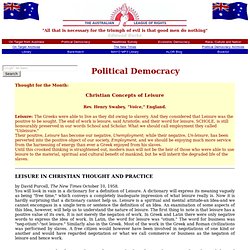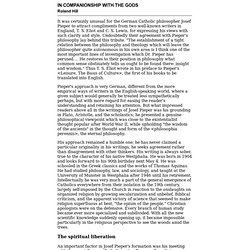

What Work Is Really For. The Stone is a forum for contemporary philosophers and other thinkers on issues both timely and timeless.

Is work good or bad? A fatuous question, it may seem, with unemployment such a pressing national concern. (Apart from the names of the two candidates, “jobs” was the politically relevant word most used by speakers at the Republican and Democratic conventions.) Even apart from current worries, the goodness of work is deep in our culture. We applaud people for their work ethic, judge our economy by its productivity and even honor work with a national holiday. But there’s an underlying ambivalence: we celebrate Labor Day by not working, the Book of Genesis says work is punishment for Adam’s sin, and many of us count the days to the next vacation and see a contented retirement as the only reason for working. We’re ambivalent about work because in our capitalist system it means work-for-pay (wage-labor), not for its own sake.
Everything depends on how we understand leisure. Leif Parsons. Christian Concepts of Leisure. By David Purcell, The New Times October 10, 1958.

You will look in vain in a dictionary for a definition of Leisure. A dictionary will express its meaning vaguely as being "free time," which conveys a completely inadequate impression of what leisure really is. Now it is hardly surprising that a dictionary cannot help us. Leisure is a spiritual and mental attitude-an Idea-and we cannot encompass in a single term or sentence the definition of an Idea. An examination of some aspects of this Idea, however, will help us to understand the nature of leisure. Leisure is an attitude of contemplation, of an inward calm, of surrendering to Reality. It has been held by many philosophers that what is hard work is good. It is obvious therefore that in classical and mediaeval Christian thought leisure did not derive its value from the relief it brings from work, nor from the fact that it can be a restorative after work or a strengthening agent for present or future work.
St. Rousseau: Social Contract. Philosopher of Virtue. Philosopher of Virtue | Josef Pieper (1904-1997) Print-friendly version Josef Pieper was born on May 4th, 1904, in the small Westphalian village of Elte, Germany. At that time not even a local train connected the isolated spot in the middle of the heath with other towns of Westphalia; whoever wanted to reach the next station had to cross a river in a small ferry-boat. Pieper's father was the only teacher at the only school of this village. Josef Pieper went to the Gymnasium Paulinum in Münster, one of the oldest German schools, which has existed for more than eleven hundred years.
His son took up that tradition as a pupil of that old institution, the buildings of which, however, were completely destroyed during World War II. A teacher at the Gymnasium Paulinum, a priest, convinced Pieper to read the works of Thomas Aquinas. Thomas' Commentary to the Prologue of St. Pieper went to the University of Münster in 1923, and later on he went to Berlin. Pieper next wrote about hope. In Companionship With the Gods. It was certainly unusual for the German Catholic philosopher Josef Pieper to attract compliments from two well-known writers in England, T.

S. Eliot and C. S. Lewis, for expressing his views with such clarity and style. Undoubtedly their agreement with Pieper's philosophy lay behind this tribute. Pieper's approach is very German, different from the more empirical ways of writers in the English-speaking world, where a given subject would generally be treated less sympathetically perhaps, but with more regard for easing the reader's understanding and retaining his attention. His approach remained a humble one; he has never claimed a particular originality in his writings, he seeks agreement rather than disagreement with other thinkers. The spiritual liberation An important factor in Josef Pieper's formation was his meeting with the great German Catholic writer Romano Guardini (1885-1968). Human and divine virtues St. The problem of faith What ultimately decides belief are personal factors.